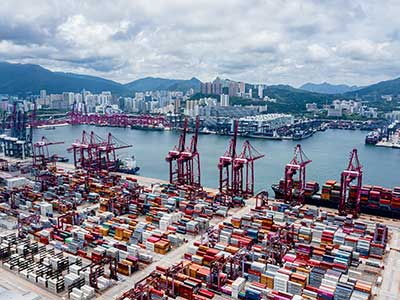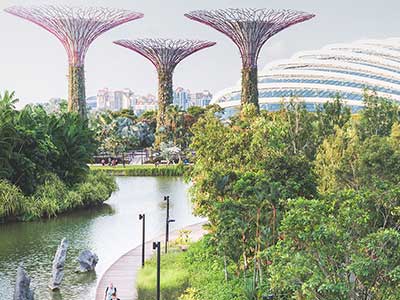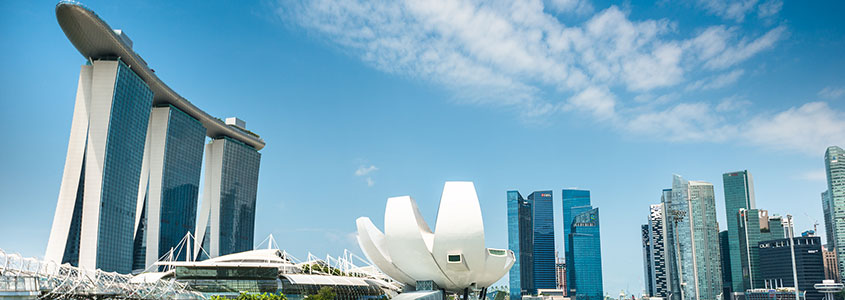Residence in Singapore
The densely populated city-state Singapore is considered to be a safe haven in Asia. For years, it has been attracting affluent families, both from Asia and beyond, interested in taking up residence. Strategically located between the Malaysian Peninsula and Indonesia, the financial centre Singapore offers a modern infrastructure, stability and security to both family offices and families of wealth.
In addition, it boasts a territorial tax regime combined with an excellent network of double taxation treaties.
Singapore’s history
In 1819, the Englishman Sir Stamford Raffles established a British trading post on the island, which is now known as the jurisdiction Singapore*. From 1819 till 1963, Singapore was under British rule, with the exception of several years during World War II, when it was occupied by Japan. During this century and a half, Singapore experienced exceptional growth, both in terms of population as well as in economic terms.
After World War II, the call for independence became increasingly louder year after year. This ultimately resulted in Singapore merging with its neighbouring jurisdiction, the Federation of Malaysia, during the years 1963-1965. This short marriage ended on 9 August 1965. The independent Republic of Singapore was established on the same date. Singapore joined the Commonwealth of Nations as a member state in 1965.
*Source: https://www.visitsingapore.com
Singapore’s government & economy

Singapore has approximately 5.5 million residents and it is one of the smallest and most densely populated jurisdictions in the world. About 75% of its residents are of Chinese origin. There are four languages officially spoken in Singapore: English, Mandarin, Malay and Tamil.
Singapore’s economy
Singapore’s economy is historically strongly connected with its port and its function as a trading hub in Asia. Its economy is especially known for being innovative and one of the most competitive and business-friendly of the world. It is also considered to be one of the least corrupt jurisdictions in the world*.
Singapore has a diversified market economy. Its economy focuses on financial services, oil refining, international trade (duty-free port) and high-tech technology. Its currency is the Singapore dollar (S$). Singapore has its own airport, which functions as one of the largest transportation hubs in South-East Asia. It also has its own airline.
Singapore is one of few jurisdictions in the world holding a AAA credit rating.
*Source: https://www.transparency.org
Taxes in Singapore
- Personal income tax: Persons who relocate to Singapore find that Singapore is one of the few jurisdictions having a system of taxation which is territorial. This means that residents of Singapore only need to pay personal income tax on income that is accruing in, or derived from a Singaporean source. Any income accruing outside the jurisdiction, or derived from a foreign source, remains tax exempt (with the exception of income from partnerships).
❝ Singapore is a great alternative for successful entrepreneurs ❞
The personal income tax rate is progressive. The maximum rate is 22% and applies to net income exceeding S$320,000 (about US$230,000). Capital gains are not taxable, unless they qualify as business income.
- Wealth tax: Singapore does not impose a net wealth tax on its residents.
- Inheritance and gift tax: Singapore does not impose inheritance or gift tax, nor estate duty.
- Stamp duty and VAT: Singapore imposes a so-called Goods and Services Tax (GST). The standard rate for GST is 7%. Stamp duty is payable on the transfer of real estate.
- Exit tax: Singapore does not levy a typical exit tax, but when leaving Singapore to relocate to another jurisdiction, you will need to pay all outstanding Singapore taxes prior to leaving the country.
Source: The International Bureau of Fiscal Documentation. Last updated: March 2020.
Special tax treatment for foreigners relocating to Singapore
There is no special tax regime applicable to foreigners taking up residence in Singapore. Singapore’s territorial tax regime is a benefit in and of itself.
For families that want to establish a single-family office in Singapore, there are efficient corporate structures available to address the family’s wealth planning objective(s).
Benefits of living in Singapore

Singapore is situated close to the equator and, therefore, enjoys high temperatures all year round; i.e. year round highs of 30 C°. It is also quite humid, having a tropical rainforest climate, with rain showers almost every (other) day.
Although almost three quarters of the population are of Chinese origin, Singapore is actually a melting pot of nationalities, all living in harmony with each other. It is this international character in combination with the Asian culture that attracts a lot of foreigners to Singapore.
The quality of the Singapore health system is very good. It also offers bilingual and international schools for foreign children. English is the standard language for education. Students are encouraged to learn a second language.
Due to high numbers of foreigners relocating to Singapore and the actual (limited) size of the jurisdiction, there is always some pressure on the housing market. One way Singapore’s government has dealt with that is land reclamation. Singapore has increased its total size by over 20% since its independence*.
*Source: http://www.nlb.gov.sg
Visa and residency permit
The first step towards residency in Singapore is to be allowed to enter Singapore. It is always advisable to first visit a jurisdiction before deciding to relocate there.
Anyone travelling to Singapore needs to be in possession of a passport that is at least valid for six months and must hold sufficient funds to sustain oneself during the stay. Onward or return travel also needs to be pre-arranged.
Visa-free travel to Singapore is possible out of most jurisdictions*, including the USA, Canada, Australia, Indonesia, Thailand, Malaysia and all European Union nations. The standard visa-free travel to Singapore allows a maximum visit of 30 days. Citizens from several jurisdictions are even allowed a 90-day visit.
❝ Singapore is one of the least corrupt jurisdictions in the world ❞
There are, nevertheless, also a number of jurisdictions whose residents need to obtain a visa before their travel. Those include countries such as China, India, and countries from Northern Africa, the Middle East and Russia. Depending on which country you are a citizen of, you will need to apply for an electronic visa online, or actually visit the nearest Singaporean Diplomatic Mission.
Visitors travelling to Singapore are prohibited from engaging in any form of business, occupation, profession, or paid employment during their stay.
*Source: https://www.ica.gov.sg
Singapore residency – The Singapore Global Investor Programme
Entrepreneurs interested in starting a business and wealthy families that want to establish a single-family office in Singapore have the possibility to obtain Singapore permanent residency (PR) through the ‘Singapore Global Investor Programme’* (Singapore Investor Visa).
Singapore’s Economic Development Board is responsible for handling all applications under the Global Investor Programme and has defined four specific family profiles to qualify:
-
Established business owners
- The applicant must possess at least 3 years of entrepreneurial and business track record;
- The applicant should currently be running a company with an annual turnover of at least S$200 million in the year immediately preceding his/her application, and at least S$200 million per annum on average for the three years immediately preceding his/her application (the numbers of a maximum of two companies may be consolidated to reach this amount);
- If the applicant’s company is privately-held, he/she should have at least a 30% shareholding in the company (in case of a publicly listed company the applicant should be one of the largest shareholders);
- The applicant’s company must be active in one or more of the specific shortlisted industries.
-
Next generation business owners
- The applicant’s immediate family should have at least a 30% shareholding or be the largest shareholder in the company used to qualify;
- The qualifying company’s annual turnover must be at least S$500 million in the year immediately preceding the application, and at least S$500 million per annum on average for the three years immediately preceding his/her application;
- The applicant must be part of the management team of the company (e.g. C-suite / Board of Directors);
- The applicant’s company must be active in one or more of the specific shortlisted industries.
-
Founders of fast growth companies
- The applicant must be a founder and one of the largest individual shareholders of a company with a valuation of at least S$500 million;
- The applicant’s company must be invested into by reputable venture capital or private equity firms;
- The applicant’s company must be active in one or more of the specific shortlisted industries.
-
Family office principals
- The applicant must posses at least 5 years of entrepreneurial, investment or management track record;
- The applicant must have net investible assets of at least S$200 million. Net investible assets include all financial assets, such as bank deposits, capital market products, collective investment schemes, premiums paid in respect of life insurance policies and other investment products, excluding real estate.
Applicants under the profiles 1, 2 and 3 should make a considerable investment in one of the three investment options A, B or C mentioned below. Applicants with profile 4 (family office principals) can only opt for investment option C.
Investment options:
- You will have to directly invest at least S$2,500,000 in a new business in Singapore, or in the expansion of an already existing business; or
- You invest S$2,500,000 in a Singapore Global Investor Programme Fund (these are approved Investment Funds that invest in companies based in Singapore); or
- You invest at least S$2,500,000 in a new or existing Singapore-based single-family office. The single-family office should manage at least S$200 million (with at least S$50 million to be deposited in a Singapore-based bank). Those assets under management can include a wide variety of on- or offshore financial assets, but real estate is excluded from the amount.
- For all profiles – Detailed curriculum vitae outlining the applicant’s work, business and/or investment experience.
- For all profiles – In case an investment will be made in a new business or single-family office, a detailed business plan needs to be submitted. It needs to cover at least five years and project the numbers as regards employment and the annual financial return (in case of a single-family office, it should explain the role of the family, all foreseen functions of the single-family office, foreseen investment sectors, asset types and geographical focus);
- For profiles 1 and 2 – In order to demonstrate successful entrepreneurship, the applicant needs to provide audited statements of his/her company (or the company of the family) in respect of the last three years. The auditor needs to be an accredited audit firm of high quality.
- For profiles 1 and 2 – Notarised copy of documents stating the applicant’s (or immediate family members) share ownership of the existing business(es).
- For profiles 1, 2 and 3 – Applicants investing in a new business should hold at least a 30% shareholding in such company and be part of its management team;
- For profiles 1, 2 and 3 – In case an investment will be made in a Singapore Global Investor Programme Fund applicants will be assessed on their future investment plans in Singapore.
- For profile 3 – Latest notarised copy of a valuation report of the company and latest notarised copy of a list of investors in the business.
- For profile 4 – The family should provide certified supporting documents to demonstrate the required S$200 million assets under management and its ownership. This can be be certified by an accredited audit firm, Singapore-based private bank, law firm or trust company. For assets held under separate structures a recent notarised copy of the investment management agreements must be provided.
In addition to fulfilling the above-described conditions and providing the necessary supporting documentation, the following must at least be submitted:
- A non-refundable application fee of S$7,000, to be paid to the Singapore Economic Development Board;
- The necessary application forms need to be completed and submitted electronically via upload:
- Form A (personal profile)
- Form B (proposed investment plan)
- Form C (payment details)
- The same forms also need to be signed and submitted in original;
- The form ”Terms and Conditions of the Global Investor Programme” needs to be signed and submitted in original;
- Signature of the Statutory Declaration Form needs to take place before a notary or Justice of Peace; applicants from non-Commonwealth countries will need to come to Singapore and sign before a Justice of Peace, Commissioner for Oaths or Judge in Singapore, or sign before authorised Singapore embassy staff in the home jurisdiction;
- Application for an entry permit to Singapore for every family member included in the application (Form 4, in original and a copy);
- Notarised copies of the passport, birth certificate, marriage certificate, divorce certificate for each applicant applying for Permanent Residence;
- Five passport-size photographs for each applicant;
- A copy of the registration of the applicant’s Singapore investment or family office with the Singapore ACRA (before and after capitalisation).
For documents that are drafted in a foreign language, an official English translation must be provided and notarised by the relevant notary public.
Should the Singaporean authorities, after reviewing the application, be of the opinion that it meets the criteria of the Global Investor Programme, an interview will be organised with the applicant. Once the application is approved, an approval-in-principle permanent residence status, which is valid for six months, will be issued to the applicant.
The spouse and children under the age of 21 can also apply for PR under the Global Investor Programme application of the main applicant. In this context, it needs to be noted that male children are obliged to join the Singaporean National Service (military service). The main applicant is exempted from National Service.
Making the investment

In case of the single-family office option, supporting documents will need to be provided, evidencing that the family office in Singapore is indeed managing S$200 million out of Singapore.
The applicant will then receive the final approval for PR.
It is also possible to obtain a Singapore residency permit if you should find employment in Singapore. This option is outside the scope of this article.
Prolongation of permanent residency
Once you have received PR, you will also be issued a re-entry permit, which is valid for five years. Without such a re-entry permit, you will not be able to travel outside Singapore without losing Singapore PR status.
After five years, you will be entitled to renew the re-entry permit for a period of three or five years, under certain conditions. One of those conditions is that you will have fulfilled all investment conditions; i.e. the ones for new business, investment fund investment or single-family office respectively.
*Source: EDB Singapore
**As permitted by relevant laws and regulations.
Singapore citizenship
Any person over the age of 21 who has received PR in Singapore, may apply for Singapore citizenship after being a permanent resident in the jurisdiction for at least two years. The spouse and unmarried children under the age of 21 can apply together with the main applicant.
Applicants need to realise that Singapore only allows its citizens to have single citizenship. Therefore, in order to receive Singapore citizenship, you will need to give up your current citizenship(s).
Applications for citizenship need to be filed with the Singapore Immigration & Checkpoints Authority.
Leaving your home country and taking up residence in Singapore

The basic rule in Singapore is that you will be considered a tax resident if you are physically present in Singapore for at least 183 days a year. Should you not intend to spend that number of days in Singapore, and rather continue spending considerable time in your ‘former’ home jurisdiction, the fiscal authorities of your former home jurisdiction could easily take the position that you did not relocate to Singapore at all. It is, therefore, important that you properly plan your move when you relocate to Singapore and actually leave your former home jurisdiction.




